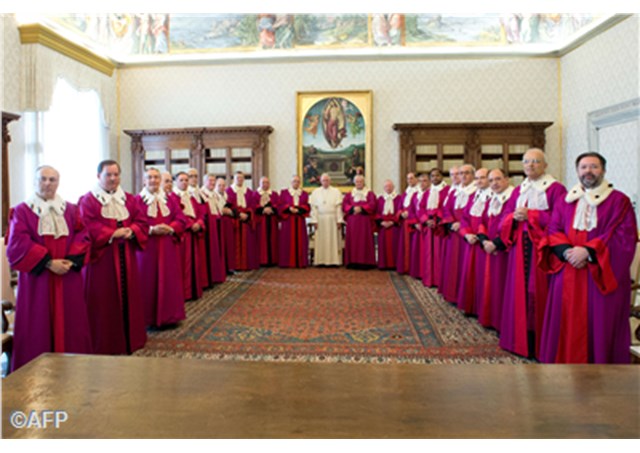
Pope Francis: rescript on reform of Roman Rota

(Vatican Radio) Pope Francis issued a legal decree on Friday, regarding the implementation of the recent reforms to the Church’s marriage law, specifically as far as the role of the Church’s highest appellate court – the Sacred Roman Rota – is concerned. The decree, called a rescript, has six main points, most dealing with technical matters of legal procedure within the Rotal system itself, and with the relationship of the Rota – which is the Church’s highest ordinary appellate court – to other courts in the Church’s legal system.
Click below to hear our report
In an explanatory note published in the edition of L’Osservatore Romano released Friday afternoon, the Dean of the Roman Rota, Msgr. Pio Vito Pinto explained that the first part of the two-part rescript has the purpose of stressing that the reforms already enacted are now in force and must be followed and obeyed. “Because every law of epochal importance, such as the laws reforming the marital nullity process, meets understandable resistance,” explained Msgr. Pinto, “the Pope desired to emphasize, as did John Paul II for the promulgation of the Code of Canon Law of 1983, that the law is now promulgated and requires compliance.”
“The second part of the rescript,” continued Msgr. Pinto, “specifically relates to the Roman Rota as Apostolic Tribunal, which has always distinguished itself for the sapientia in its judicial decisions.” As an example of this distinction, and of Pope Francis’ ongoing confidence in it, Msgr. Pinto cited the return to the ancient formula of “generic doubt” in cases before the Rota for adjudication. Msgr. Pinto also specified that lower courts are still obliged to adjudicate specific questions, which, if found present, could give grounds for finding a marriage null.
The rescript itself in its preamble affirms its desire to serve the supreme law, which is the salvation of souls, and that all the Church’s legal structures serve therefore as vehicles of reconciliation and renewal for the faithful who have recourse to them.
Below, please find Vatican Radio’s translation of the full text of the rescript, made from the Italian text distributed by the Press Office of the Holy See
************************************
The entry into force - in happy coincidence with the opening of the Jubilee of Mercy – of the Apostolic Letters motu proprio, Mitis iudex Dominus Iesus and Mitis et Misericors Iesus on August 15, 2015, given for the purpose of actuating justice and mercy regarding the truth of the bond of those who have experienced matrimonial failure, poses, among other things, the need to harmonize the renewed procedure for cases trying claims of marital nullity with the rules proper to the Roman Rota, pending the reform of these last.
The recently concluded Synod of Bishops expressed a strong exhortation to the Church, that the Church reach out toward “her most fragile children, marked by love wounded and lost (Relatio finalis, n. 55), to whom it is necessary to give back confidence and hope.
The laws now taking effect want to show precisely the closeness of the Church to wounded families, desiring that the multitude of those who live the drama of marital failure be reached by the healing work of Christ through ecclesiastical structures, in the hope that they might discover themselves new missionaries of God's mercy toward other brothers and sisters, for the good of the institution of the family.
Recognizing the Roman Rota, in addition to its proper munus as ordinary appellate tribunal of the Apostolic See, as having also the munus of safeguarding the unity of law (Art. 126 § 1 PB) and that of aiding in the ongoing formation of pastoral workers in the Tribunals of the local Churches, the following is established:
I.
The laws reforming the aforementioned marriage nullity process abrogate or derogate every law or norm to the contrary hitherto applicable: general, particular, or special, even if approved in specific form (e.g. The MP Qua cura, given by my Predecessor Pius XI in times very much different from the present).
II.
- In marriage nullity cases before the Roman Rota, the dubbium is fixed according to the ancient formula: An constet de matrimonii nullitate, in casu.
- There can be no appeal against decisions of the Rota with respect to invalidity of judgments or decrees.
- No recourse is allowed before the Roman Rota to the Nova Causae Propositio (N.C.P.), after one of the parties has contracted a new canonical marriage, unless the injustice of the decision is manifestly established.
- The Dean of the Roman Rota has the power to dispense for grave reason from the Rotal Norms in procedural matters.
- As urged by the Patriarchs of the Eastern Churches, competence in iurium cases connected to marital nullity cases submitted to the judgment of the Roman Rota on appeal, is restored to territorial tribunals.
- The Roman Rota shall judge cases according to the gratuity of the Gospel, that is, with ex officio legal aid, salvo the moral obligation for the wealthy faithful to make an oblatio iustitiae in favor of the causes of the poor.
May the faithful, especially the wounded and unhappy, look to the new Jerusalem that is the Church, as the “Peace of justice and glory of godliness, (Bar 5: 4)” and may it be granted to them, finding the open arms of the Body of Christ, to intone the Psalm of the exiles (126:1-2): “When the Lord restored the fortunes of Zion, we were like those who dream. Then our mouth was filled with laughter, and our tongue with shouts of joy.”
| All the contents on this site are copyrighted ©. |


